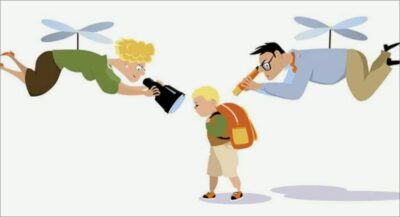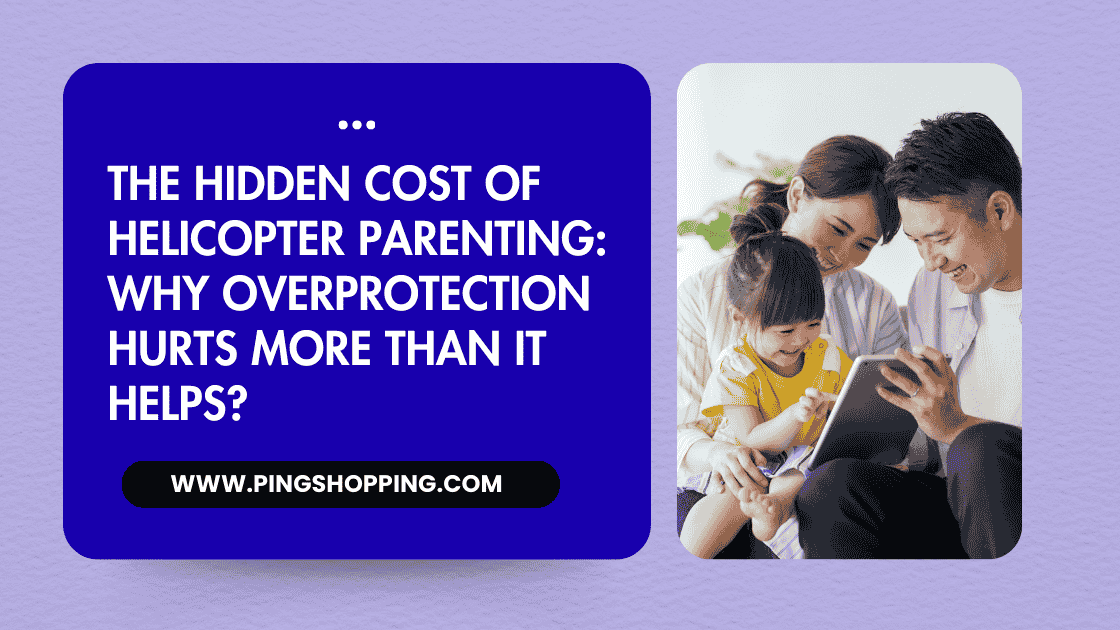In our competitive and fast-paced world, parents feel an increasingly desperate need to protect their children from harm, failure, or disappointment. This instinctive tendency, however, slowly evolves into the so-called helicopter parenting. The term describes parents who always shadow every move of their children—planning their studies, social life, sports, and even professional careers. After all, what parent doesn’t want the best for their child? However, beneath the surface lies a hidden cost: the unintentional stunting of a child’s emotional resilience, independence, and long-term success.
What Is Helicopter Parenting?
Helicopter parenting is not just about being involved in a child’s life. It is micromanaging. Parents may watch homework every step of the way, intervene in every argument, or control decisions their child can make for themselves. Some common examples are:
- Calling a teacher to argue about a grade.
- Detailed listing of a child’s agenda minute by minute.
- Intervening to resolve playground conflicts.
- Forbidding teenagers from making day-to-day decisions, such as picking out clothes or activities.
- While this form of parenting typically stems from love and concern, it eventually robs children of the opportunity to grow into secure, competent adults

Why Do Parents Hover?
To shatter helicopter parenting, knowing why it happens is essential. Some typical reasons include:
- Fear of Failure: Parents believe that mistakes will ruin their child’s future. Instead of seeing mistakes as a chance to learn, they treat mistakes as obstacles to achievement.
- Social Pressure: Social networking showcasing “perfect” children and highly successful kids pressures parents into living up to unrealistic standards.
- Changing World: Competition for college acceptance and work, increased, leads parents to believe that micromanaging is the secret to ensuring their child’s success.
- Anxiety and Control: Sometimes hovering is as much about a parent’s desire to be in control or his or her own anxiety over the unknown.
The Hidden Costs for Children
Helicopter parenting not only annoys children—it actually creates long-term development barriers. Let’s examine some of the unspoken costs.
1. Not Being Resilient
If parents step in constantly, children never get to struggle with problem-solving. Resilience is based on trial and error, but if everything is removed as an obstacle, children are rendered flaccid and unable to handle the pressures of true life.
2. Unable to Make Good Decisions
Children who are never allowed to make choices can turn into slackers when it comes to independence. When they do experience adult decisions—fiscal, social, or career-related—they lack confidence in making decisions for themselves.
3. Elevated Stress and Depression
Rather surprisingly, constant parental monitoring has a tendency to perpetuate the very anxiety that it is attempting to prevent. Studies suggest that helicopter children are more likely to experience higher levels of stress, anxiety disorders, and depression.
4. Strained Parent-Child Relationships
Too much control tends to create resentment. Instead of supported, children are left feeling smothered and may retaliate with secrecy, rebellion, or emotional distance.
The Hidden Costs for Parents
Helicopter parenting isn’t just bad for kids—it’s also bad for parents.
- Burnout: The necessity of micromanaging every single detail of a child’s life is exhausting and unsustainable.
- Loss of Identity: Parents get so engrossed in their kids that they tend to neglect their own lives, careers, and relationships.
- Future Guilt: Over-involvement creates future guilt when children fail in adulthood and parents think about whether what they did was beneficial or harmful.
Breaking the Cycle
There is always a silver lining – it’s never too late to break the cycle of helicopter parenting. Establishing healthier dynamics benefits both parents and children.
1. Practice “Good Enough” Parenting
Perfection is not the goal—presence and leadership are. Let children learn from mistakes, and lead them without doing for them.
2. Encourage Age-Appropriate Independence
Early on, let children have small decisions to make—what to munch on, what to wear, or how to spend free time. Those small decisions develop self-confidence over time.
3. Redefine Failure as Growth
Don’t shield children from failure. Teach them to view setbacks as steppingstones. Rather than inquiring, “How might we have prevented this?” inquire, “What did you learn?”
4. Establish Healthy Boundaries
Respect your child’s privacy and sense of self. Provide them with space to explore friendships, hobbies, and self-expression without monitoring.
5. Focus on Your Own Growth
Parents thrive when they are accomplishing their own goals and dreams. By demonstrating independence and balance, you are indirectly teaching your children to do the same thing.
A Balanced Strategy
It is important to remember that being involved in your child’s life is not a bad thing. The key is balance. Children need instruction, guidance, and love, but they need room to fall, trip, and get back up again.
Think of it as learning to ride a bicycle. You hold onto the handlebars initially, you steady them. Somewhere along the line, though, you let them go—even though you’re certain they’ll fall. Because it’s in the falling over, the wobbling over, and the attempting again that true growth takes place.
Final Thoughts
Helicopter parenting originates in love, but its underlying costs quietly erode a child’s ability to thrive in the world. By modeling resilience, independence, and emotional intelligence, parents can help their children not just muddle along, but truly thrive.
Parenting isn’t a matter of never making mistakes—it’s a matter of showing children how to handle them with strength and good sense. In giving room, we give our kids the greatest gift of all: the courage to fly on their own.





